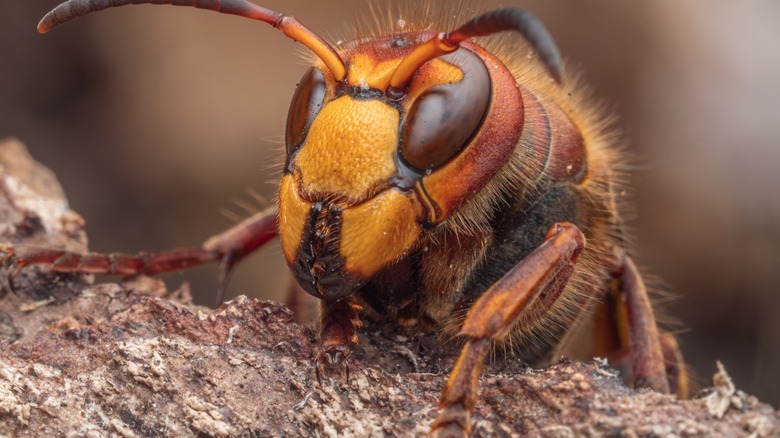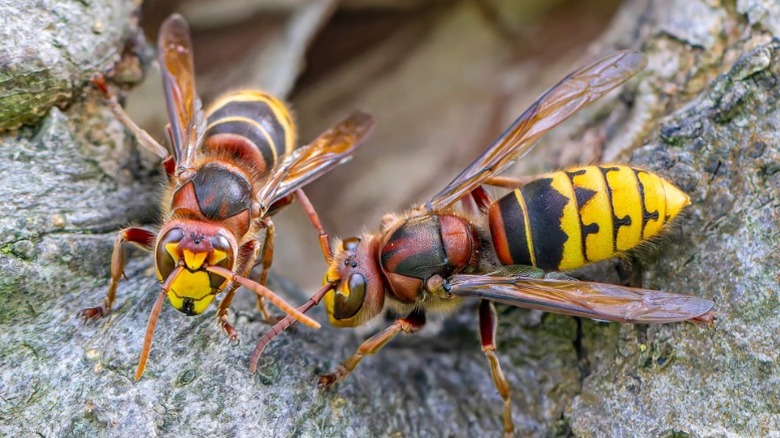What To Know About Aggressive Hornets In The Fall
If you've seen The Hunger Games, you remember the terrifying "tracker jackers." Those genetically engineered wasps are pure fiction, but real hornets aren't harmless either. Come fall, their stings can pack a serious punch — and in some cases, be dangerous. Hornets and wasps are much more active during fall, due to their life cycle. As summer winds down, hives crank out new queens, as well as males for successful mating. Once the queens mate, they hibernate and prepare the next generation of colonies, while the worker hornets won't survive the winter. Knowing their time is limited, the workers buzz with extra energy and heightened defensiveness, making them on edge and more likely to sting anyone who wanders too close.
Another reason is food supply. Once fall rolls in, hornets switch up their diets. The insects and other protein sources they normally hunt start disappearing, so they turn to sweeter options like fruit, candy, or even spilled drinks left outside. That's what pushes them closer to people, turning patios, picnic spots, and backyard hangouts into prime sting zones. If you still have late-blooming flowers or shrubs, your yard might have just turned into a hornet hotspot.
Hornets also get extra touchy about their nests this time of year. With winter coming, anything that seems like a threat — gardening, barbecuing, or even just walking nearby — can spark a not-so-friendly confrontation. Their drive to defend their home, combined with hunger and a ticking biological clock, makes fall encounters especially risky. Spot the nest, give it space (even if it's in your yard), and you'll avoid finding out just how sharp those stingers can be.
How to avoid encounters with hornets
The first thing you want to do during this time is to give hornet nests a wide berth. Avoid disturbing the tree, wall, or structure where a nest is tucked, and steer clear of peering into cracks, holes, or crevices you can't see into. Even a curious glance, a sudden movement, or vibrations from nearby activity can trigger a hornet's defensive instincts, and once they feel threatened, a single sting can escalate into multiple ones as nestmates rush to defend their home.
You can also reduce the chances of attracting hornets by removing anything that might tempt them into your space. Keep outdoor food and drinks covered, rake up fallen fruit, and make sure trash cans have tight-fitting lids. Strong scents from perfumes, scented soaps, shampoos, or lotions can draw foraging hornets, so it's best to minimize heavily scented products when you're outside during peak hornet activity.
If you encounter a hornet, stay calm and move slowly. Avoid swatting or striking it, and gently guide it away with a piece of paper or long object if needed. Outdoor lighting can attract hornets, and the insects they hunt, so switching to motion-activated lights or bulbs with a warmer color temperature can help keep your patio, picnic area, or backyard safer. You can also plant fragrant herbs like rosemary around your patio or garden to naturally steer hornets away from your outdoor hangouts. And, if a nest truly needs to be handled before winter, hire a professional or follow pesticide instructions carefully. Homemade attempts, like flooding, burning, or shaking a nest, are rarely effective and usually increase the risk of painful stings.

